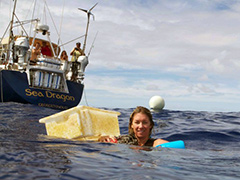The Plasticization of Our World’s Oceans
Apr 10

The research involves dragging nets to pull up and measure not only the quantity of the plastic trash, but the size. Nets are being pulled up with what is being called ‘microsize’ plastics. These measure from marble sized down to the size of a grain of rice. They have traveled thousands of miles, and each time they pull up their net they find from ten to thirty of the microsize plastic pieces. This discovery is actually confirming the worst, everywhere you go in the ocean, you will find plastic waste. In essence, we have plasticized our seas with toxic debris. The broader clean up scope on the plastic pollutants has made a shift so that experts now realize it will take fine mesh nets and continual dredging to make any efficient clean up process possible.
Two other parts of the research includes finding the time length for the establishment of sea life communities including crabs, barnacles and mollusks and whether or not they can actually use the plastic to travel in a cross continent method; the additional study measures the chemical pollutants. Sea life grows in specific areas that are balanced for the ecology; the research is looking to see whether various sea life can use the plastic to invade new areas and create an imbalance.
The second leg of the journey will bring a change of course to the Hawaii to Tokyo areas and they will embark on a study to find out the quantity of debris that was dislodged into the ocean by the Japanese tsunami. This portion of the research will also examine those items that are not wind-effected; typically the larger items such as refrigerators and boats. The purpose is to get a better picture of the total level of debris, those that may contribute to chemical pollution and a better picture that will help in the clean up process.
Sources: http://edition.cnn.com/2012/05/21/world/asia/algalita-eco-solutions/index.html?iid=article_sidebar
Related Posts
- Plastic Debris Represents Enormous Environmental Risk for Oceans
- Paradox of 1970/1977 Clean Air Act
- Top 10 Most Greenest U.S. States
- Cosmetics and Sunscreens Contain Toxic Titanium Вioxide
- Bottled Water: We are drinking our way to pollution
Leave a Reply
You must be logged in to post a comment.




